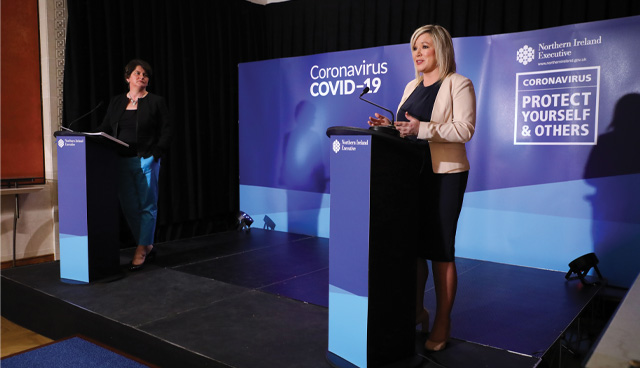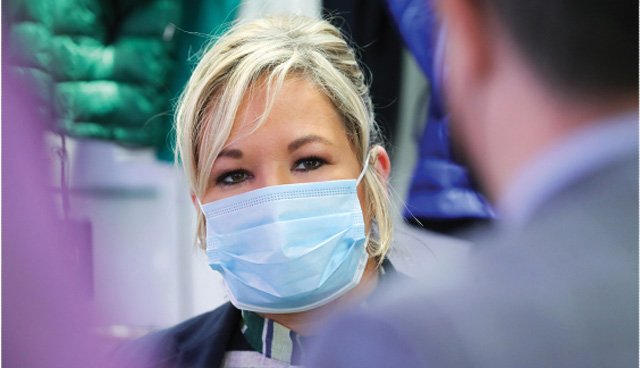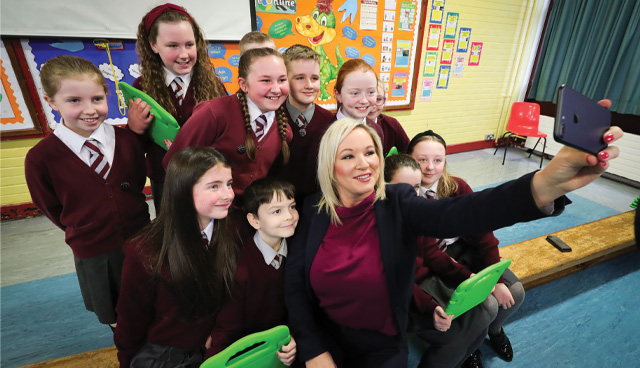Power sharing in a pandemic

David Whelan talks to deputy First Minister Michelle O’Neill about the pandemic response, Brexit and following through on the promises set out in the New Decade, New Approach (NDNA) agreement.
How far have the NDNA ambitions been set back by the pandemic?
When the Assembly and Executive were restored in January after three years without functioning government, it was with a shared commitment to deliver the services, society and future that our people need and deserve.
I think people were right to be optimistic, because I believe there was, and is, a genuine collective desire and determination by the five-party coalition to deliver the improvements needed to make that happen.
We knew there would be challenges along the way, but none of us could have predicted when we took up office in January that in only a matter of weeks that we would be dealing with a global pandemic that would have such devastating impacts on every part of society, community and people’s lives and livelihoods.
So, of course, our minds and our efforts turned to the Covid crisis as an absolute priority. This has meant months of intense work focussing on our response to the pandemic. And while our desire to make progress hasn’t changed, unfortunately the pandemic response has obviously had consequences for our ability to move forward with many of the issues we need to tackle.
But it must be stressed that the New Decade, New Approach was the political basis for the institutions being restored, and so the Executive along with both the Irish and British Governments must now deliver and implement those commitments in the autumn/winter period ahead.
Where progress has been made is for instance on establishing the Historical Institutional Abuse Redress Board, giving victims and survivors access to the redress they deserve. And we have advanced plans and allocated funding to establish the Graduate Entry Medical School at Magee which will be a real boost for the regional economy in the North West.
As we look now towards recovery and how we begin to rebuild, New Decade, New Approach will be central as we plan for the outcomes we need to deliver. But the ambition remains, as does our shared desire to make life better for people here as we work to move forward together.
What’s your assessment of how the Executive has managed the pandemic to date?
Well firstly, I’m pleased we did manage to reach an agreement to get back in to government in January so that we were in place to respond to the pandemic. All parties and ministers have worked at breakneck speed and very closely to co-operate and deliver the response to the best of our abilities.
As a devolved administration, I believe it needed a localised approach and understanding of issues to respond in the best way possible. It was very clear from the outset that every minister in the Executive was, and is, united with a single overriding objective to save lives. This is paramount.
Politics can often be slow and be process driven, but we were working at fast pace, meeting multiple times every week and taking decisions that, in normal circumstances would likely have taken months for the system to calibrate. We have been working with ministers across the whole island and this has been invaluable to managing risks and avoiding a second spike on the island of island.

It has no doubt been one of the most challenging times any of us have ever been through as political leaders. We have had to take some really difficult decisions and impose restrictions on people’s lives which, while absolutely necessary, had serious consequences.
It has been equally difficult coming out of lockdown and trying to get the balance right between protecting public health and restarting community life and rebooting our economy in a balanced manner. Our approach has been to do this in a phased, incremental and flexible way and this has served us well.
We are still in the midst of this pandemic and Coronavirus still poses a real threat. We will reflect on everything that has happened but at present our focus remains on keeping people safe and saving lives. We have not been as hard hit as other regions as a result of our partnership with the public. People have made huge personal sacrifices and stepped up to look after and protect one another to get through these difficult times. It’s important to recognise the collective effort and thank the public for what they’ve done and continue to do. Our frontline workers, and health service staff have been outstanding in their bravery, professionalism and self-sacrifice over the past seven months.
The agreement had a pledge that the new administration would operate differently, what has changed since the resumption of power sharing?
The New Decade, New Approach document created the space for a new approach to politics. The public made it clear they wanted to see genuine power sharing and political institutions deliver for everyone. We are committed to delivering that.
It’s up to us to build that confidence back and all ministers are committed to doing so. While Covid has very much been driving the direction of the Executive to date, good progress has been made to improve the way the systems and structures of government work.
Conor Murphy, the Finance Minister has led the work to strengthen the governance and accountability arrangements for ministers. We have a strengthened the Code of Conduct for Ministers and new guidance for ministers in the exercise of their official functions. We also have a new Special Adviser Code which was published in January.
The codes set out the high standards expected of us in public office. It’s right that people should expect those standards from us and we need to lead by example.

We’re a small island, a single epidemiological unit, and it makes sense to have a joined-up approach when it comes to public health.
A number of commitments were made in the New Decade, New Approach document in order to strengthen power sharing and we are determined to see those commitments fulfilled. We now need to see the British Government stepping up and honouring its commitments made in the document, including financial commitments.
As we move forward, we need to deliver for people, and that can’t just be about getting things done, it will be about getting things done right.
In anticipation of a new Programme for Government, is the working relationship between yourself and First Minister Arlene Foster conducive to delivering an agreed plan for economic and societal improvements for Northern Ireland?
Well we are in a mandatory power sharing coalition made up of five different parties. So of course, we’re not going to agree politically all of the time, but we are grown-ups so we’ll give our views and try to reach consensus. There’s always going to be differences of opinion, different positions and different emphasis on issues.
But there are also many things we do agree on. One of those is the agreement on the need to build a better society for all and delivering high quality public services for taxpayers.
That’s something which I believe we’re all committed to and want to work together to deliver. And it needs to be the focus of a Programme for Government which is built around outcomes.
The reality is that Covid has changed everything, and any plan for delivering economic and societal improvements needs to be seen in the context of recovery for the foreseeable future. It will take us all working together to achieve that.
Given the relatively short time left of the current Assembly mandate, can you identify three specific things that you’d like to achieve?
We know what the problems are, we understand the issues, now we have to make progress and deliver. Again, that delivery has to be viewed in the context of recovery from the impacts of the pandemic but we also have an opportunity to develop new, better, quicker ways of delivering those outcomes that we want to see at the far end.
There’s no doubt that Covid will deal a huge blow to employment rates which will impact on the lives of many workers and we need to put a focus on economic recovery. We need to work hard to repurpose our economy but we also need to do it the right way.
Myself and Arlene Foster as leaders of the Executive are engaged with stakeholders and sectors, alongside ministers from every department on how we can get this right.
We have an opportunity in rebuilding to build an economy that is fairer and more balanced; that protects workers. The economy won’t rebuild itself. It is going to take a coordinated and sustained approach over a lengthy period of time to recover and safeguard jobs and ensure businesses are not at a competitive disadvantage.
Developing our infrastructure is also a priority and has to be part of our wider economic and societal recovery. We will see key infrastructure projects moved on significantly very soon, including the A5 and A6 projects and the redevelopment of Ulster GAA ground Casement Park.
Everything we do in government comes back to people. It’s about making lives better, making people healthier and happier and making our communities safer.
We also need to see the continued transformation of the health service in line with the Bengoa report. Our health workers have worked so hard and gone above and beyond during this pandemic and we need to build a health service fit for the workers and patients.
Further reform of the civil service will help us to deliver that and it’s something I would like to see more progress on. It’s not about reform for reform’s sake; it is about delivering better services for all.
Has the pandemic response shifted focus away from Brexit and what are the impacts for Northern Ireland if a deal is not reached?
While the current focus has quite rightly been on Covid-19, we’ve never lost sight of the fact that Brexit is looming. The transition period is set to end on December 31 this year, we’re very conscious of that. We are potentially facing a low deal or a no deal.
Sinn Féin have worked at securing special status for the North which prevents a hard border on the island, protects the Good Fridays Agreement and the peace we enjoy and which safeguards our economy, jobs and minimises the impact Brexit will have here. It’s about relationships — both north-south and east-west. Those relationships are critical.
It’s no secret that we believe an island of Ireland approach is essential. A no-deal scenario would be disastrous for businesses north and south. It is clear from the British Government’s negotiations approach that it is showing no regard or concern for the impact of Brexit on the North, our people or our economy.
More and more people are now looking at their future and considering the merits of alternative options that would see us rejoining the EU again, including through the provision set out in the Good Friday Agreement for a referendum on Irish unity.
Having met with the new-look government in the South and recently attended the resumed North South Ministerial Council (NSMC), what do you identify as the areas of maximum opportunity in co-operation and what are the challenges facing those?
When the institutions were re-established in January, it was on the basis of the full restoration of all the institutions of the Good Friday Agreement. The North South Ministerial Council is a cornerstone of the Good Friday Agreement and it provides for ministers to work together on a north-south basis for the benefit of all the people of the island.
That means all the institutions of the Good Friday Agreement are now up and running.
The recent meeting of the NSMC was very significant because it brought together all eight parties in government on the island to work together on areas of mutual interest, and of course there are many.
We have seen the benefits of all-Ireland partnerships for many years especially on health projects like the North West Cancer Centre. And of course the Covid crisis has shone a light on the need for closer cooperation and close relationships.
Politics can often be slow and be process driven, but we were working at fast pace, meeting multiple times every week and taking decisions that, in normal circumstances would likely have taken months for the system to calibrate.
We’re a small island, a single epidemiological unit, and it makes sense to have a joined-up approach when it comes to public health. It’s crucial that we use every opportunity to collaborate as we work our way through all the complex issues of response and recovery.
Brexit of course presents challenges, and there are concerns around the implications it will have across the island. This is certainly an area where we need to maximise any opportunities to work together to ensure the best possible outcome for our citizens and businesses.
I welcome the creation of the Irish Government’s Shared Island Unit and I hope it will add to the discussion on the issue, north and south. We absolutely need a shared vision for the future of this island based on mutual respect and understanding. I think there is an opportunity now to reach out and engage with people in all parts of the island around how we go about achieving that together. If we do not move forward together, we are not going far.
What is the long-term outlook for Northern Ireland’s societal and economic wellbeing over the next decade?
It’s difficult to say what the full long-term impacts of Covid-19 will be, but we need to be realistic; we know there will be huge challenges.
The pandemic has brought serious hardship to people’s health and wellbeing, our young people’s education, the economy and people’s livelihoods. And that’s just looking at the immediate impacts, this will have knock-on effects on society for years to come.
Rebuilding will take effort, but within that there is an opportunity to do things differently. We can make society fairer, greener and more equal. Our mission is to deliver on health, education, jobs and opportunities for everyone across the whole community.
Recovery won’t be easy and there is no doubt hard work ahead if we’re really going to change things for the better. We must work together to solve the problems facing this society.
We will apply the full powers and resources of the Executive and Assembly to address the major issues of the day facing those whom we all represent. For my part, I’ll not be found wanting when it comes to confronting these issues and working with the other parties and ministers to deliver real change.





